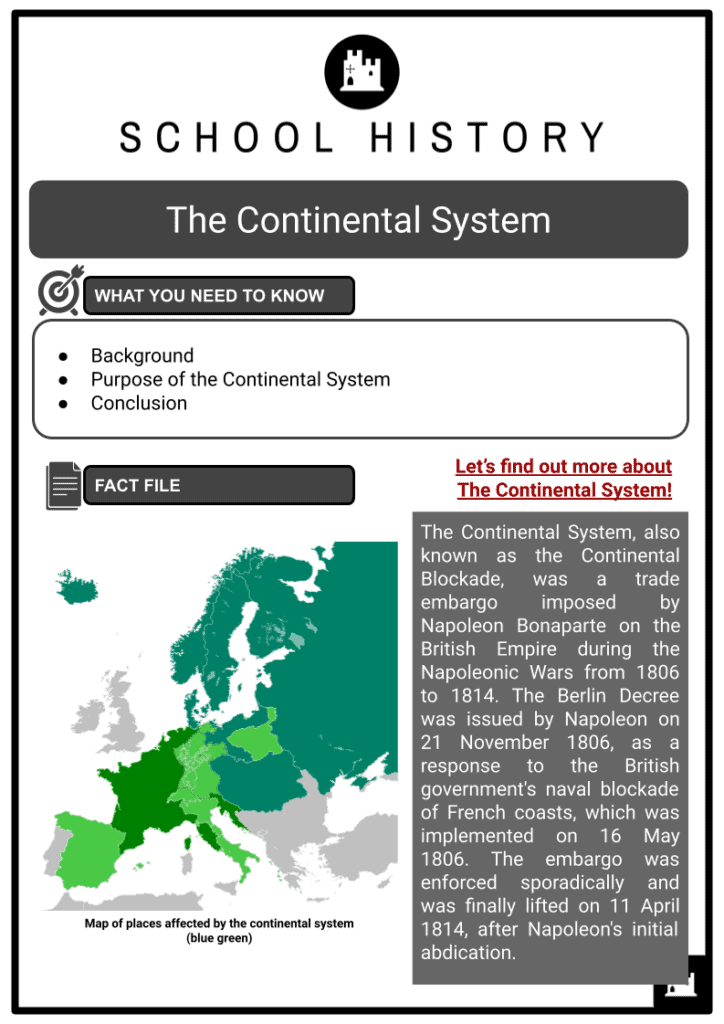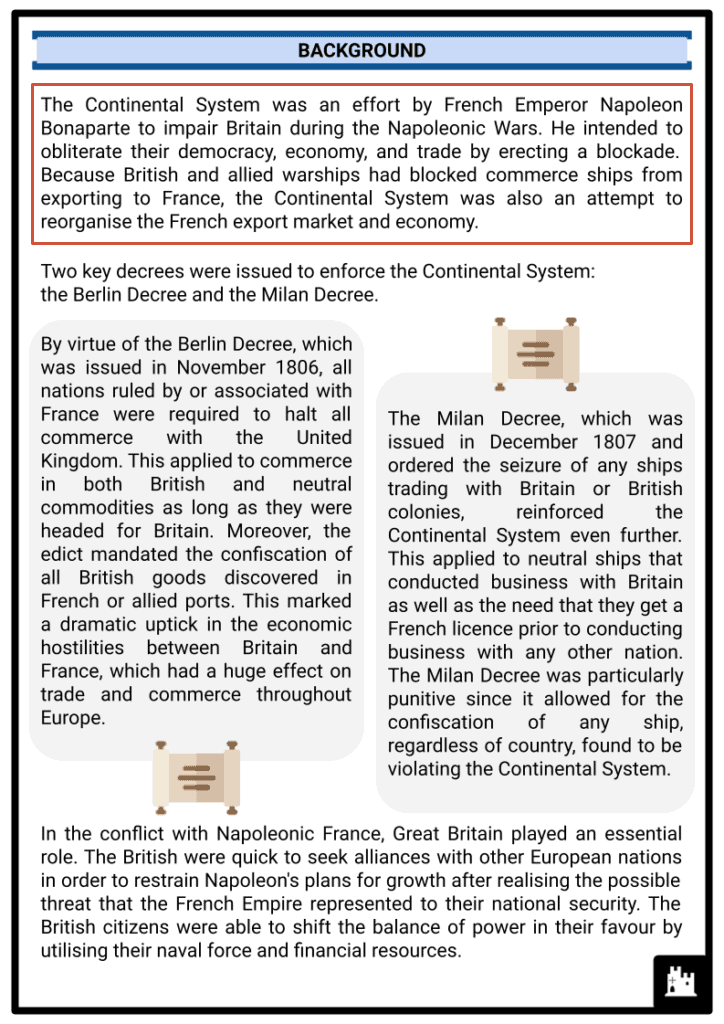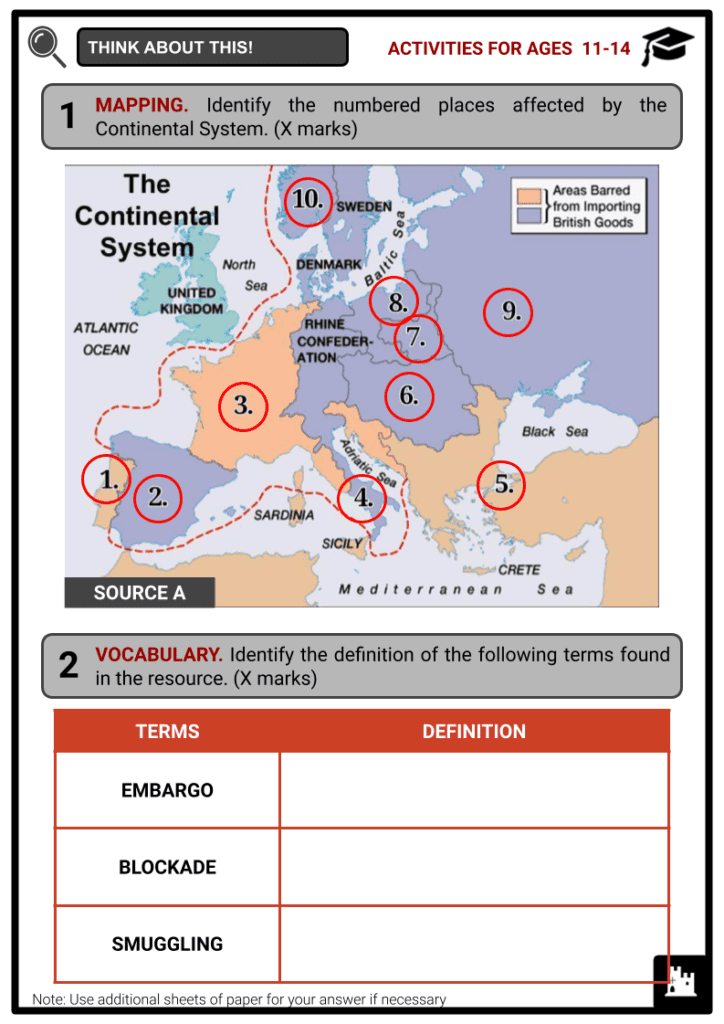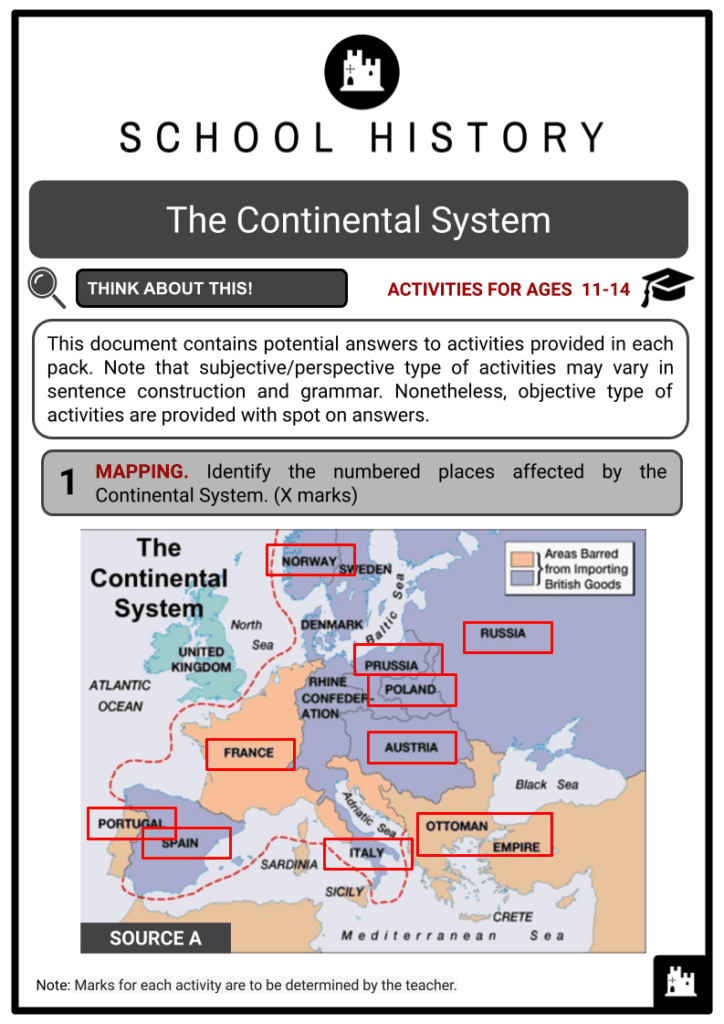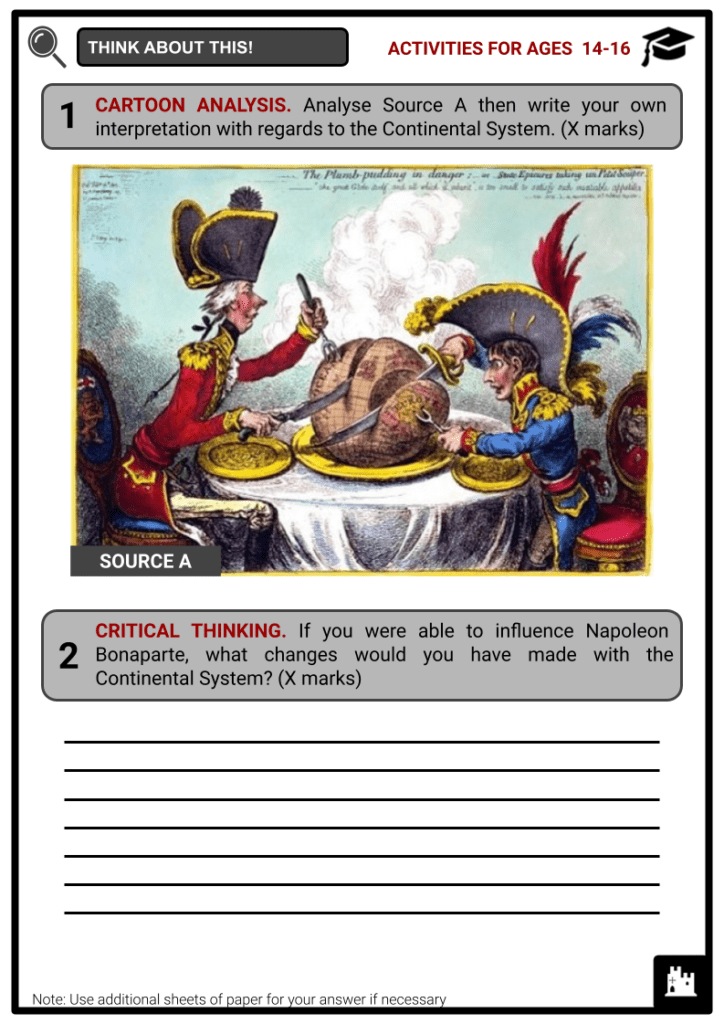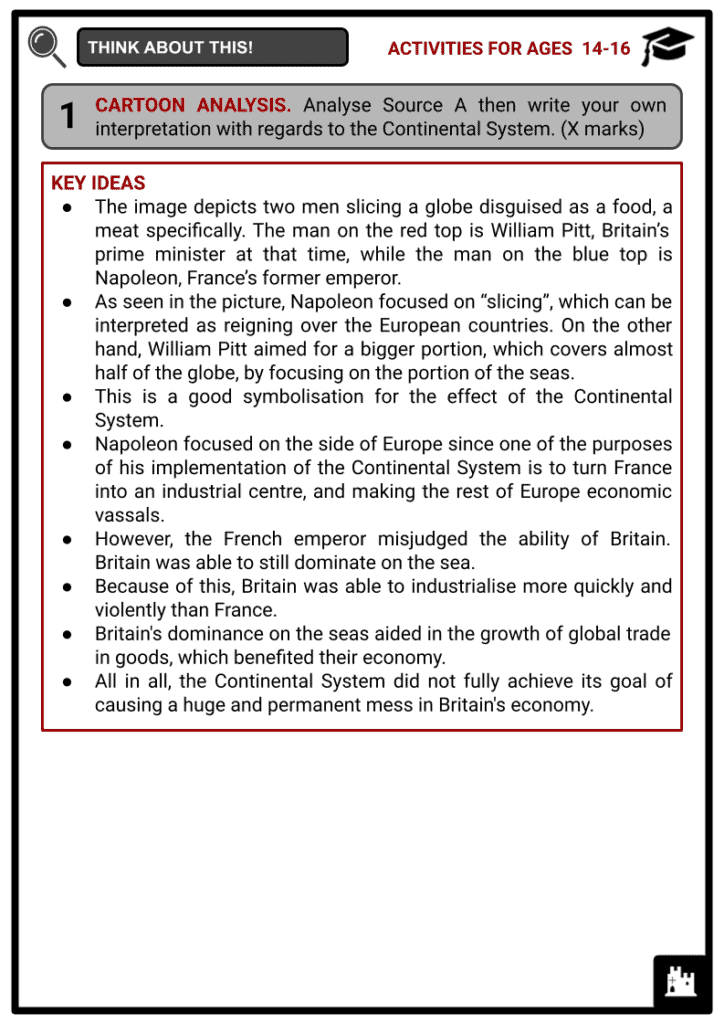The Continental System Worksheets
Do you want to save dozens of hours in time? Get your evenings and weekends back? Be able to teach about The Continental System to your students?
Our worksheet bundle includes a fact file and printable worksheets and student activities. Perfect for both the classroom and homeschooling!
Summary
- Background
- Purpose of the Continental System
- Conclusion
Key Facts And Information
Let’s find out more about the Continental System!
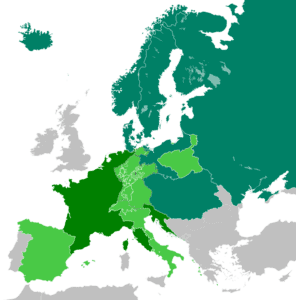
The Continental System, also known as the Continental Blockade, was a trade embargo imposed by Napoleon Bonaparte on the British Empire during the Napoleonic Wars from 1806 to 1814. The Berlin Decree was issued by Napoleon on 21 November 1806, as a response to the British government's naval blockade of French coasts, which was implemented on 16 May 1806. The embargo was enforced sporadically and was finally lifted on 11 April 1814, after Napoleon's initial abdication.
BACKGROUND
- The Continental System was an effort by French Emperor Napoleon Bonaparte to impair Britain during the Napoleonic Wars. He intended to obliterate their democracy, economy, and trade by erecting a blockade. Because British and allied warships had blocked commerce ships from exporting to France, the Continental System was also an attempt to reorganise the French export market and economy.
Two key decrees were issued to enforce the Continental System: the Berlin Decree and the Milan Decree.
- By virtue of the Berlin Decree, which was issued in November 1806, all nations ruled by or associated with France were required to halt all commerce with the United Kingdom. This applied to commerce in both British and neutral commodities as long as they were headed for Britain. Moreover, the edict mandated the confiscation of all British goods discovered in French or allied ports. This marked a dramatic uptick in the economic hostilities between Britain and France, which had a huge effect on trade and commerce throughout Europe.
- The Milan Decree, which was issued in December 1807 and ordered the seizure of any ships trading with Britain or British colonies, reinforced the Continental System even further. This applied to neutral ships that conducted business with Britain as well as the need that they get a French licence prior to conducting business with any other nation. The Milan Decree was particularly punitive since it allowed for the confiscation of any ship, regardless of country, found to be violating the Continental System.
- In the conflict with Napoleonic France, Great Britain played an essential role. The British were quick to seek alliances with other European nations in order to restrain Napoleon's plans for growth after realising the possible threat that the French Empire represented to their national security. The British citizens were able to shift the balance of power in their favour by utilising their naval force and financial resources.
- Napoleon's war against Britain was hampered in large part by the British Navy's enormous superiority against the French Navy. This meant that France would have to find alternative means to destroy the British economy, as it was impossible to invade Britain directly. Napoleon's approach was to engage in economic warfare by stifling British trade with embargoes and blockades.

Napoleon Bonaparte - Britain was extremely vulnerable to these economic attacks because it was the hub of industry and commerce in Europe. Napoleon thought that by severing commercial ties with Britain, he might unleash inflation and debt, which would weaken the British economy and ultimately bring about its demise. As a result, in 1806, Napoleon enacted the Berlin Decree, which prohibited his allies and conquered nations from conducting business with Britain.
- The Orders in Council of 1807, which restricted commerce with France, its allies, and neutral nations, were a response from the British government. The Royal Navy was also directed to blockade French and ally ports to prevent trade from reaching them. Napoleon replied with the Milan Decree, which ordered that all neutral vessels using British ports or paying British duties be treated as British and confiscated.
- The British economy remained robust despite these regulations, in large part because of its capacity to build new economic relationships and alternate trade channels. By intercepting French ships and upsetting their supply systems, the British were also able to stymie French trade.
- For some parts of Europe, the Continental System produced contradictory outcomes.
- While increased commerce with France helped some regions, it hurt others.
- For instance, because all silk had to be produced in France, Italy's silk manufacturing sector was nearly completely decimated.
- The Italian economy was severely damaged, and there was a great deal of civil discontent as a result.
- Also, because they were cut off from profitable British commerce, the majority of the ports and their surrounding areas suffered.
- Moreover, the Continental System was applied unevenly, which caused certain places to be more negatively impacted than others.
- Certain regions were allowed exemptions from the system, while others were subject to tight enforcement.
- As a result, France and Napoleon came under fire for showing favouritism.
CONCLUSION
- The Continental System was one of Napoleon's worst miscalculations. He did economic damage to the regions of France and his friends, who relied on commerce with Britain for just a little growth in output in some regions of France. In addition, he exaggerated the Continental System's capacity to harm the British economy while underestimating the influence of Britain's economic might. As a result, the Continental System was only partially effective in sealing off Britain from the rest of Europe.
- In addition, Napoleon's efforts to maintain the embargo led to other battles, including the exhausting Peninsular War, in which France sought to restrict Portugal from trading with Britain. This invasion started a protracted struggle that depleted French resources and manpower. The disastrous French decision to attack Russia was also influenced by the Continental System, as Napoleon tried to impose the embargo and stop Russia from dealing with Britain.
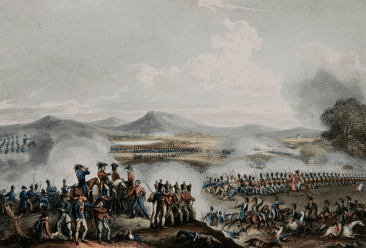
Peninsular War - Also, the conquered areas that suffered under French control developed animosity and antagonism as a result of the Continental System. Instead of being viewed as a strategy to challenge British economic dominance, it was perceived as an instrument of French economic dominance and colonialism. This opposition encouraged nationalist movements across Europe and contributed to the eventual collapse of Napoleon's empire.
- The Continental System also had unforeseen effects on France's economy. The arrangement compelled French traders to rely on domestic markets and hindered commerce with Britain, France's biggest commercial partner. Due to this, certain regions had overproduction, which brought about glutes and price declines, while other regions experienced shortages and high prices. As a result, the French economy grew more unsteady, and inflation became a serious issue.
PURPOSE OF THE CONTINENTAL SYSTEM
- Britain's commerce with Europe, which was a vital source of income for Britain, was to be cut off by the Continental System. Napoleon intended to drain Britain's gold, generate inflation, and damage the British economy in order to bring about a political breakdown or revolution by cutting off this source of income. Moreover, he anticipated that the Continental System would stop British aid to Napoleon's adversaries, allowing him to conduct war more easily.
- The Continental System had to be utilised throughout the continent for a considerable amount of time in order to be successful. The strategy, however, was only completely successful between the mid-1807 and mid-1808 and mid-1810 and 1812 time periods due to the varying conflicts.
- British commodities flowed out during the Continental System's gaps, and South America was opened to Britain as the latter supported Spain and Portugal. Notwithstanding these difficulties, British exports maintained their competitiveness. Although the system contributed to a downturn in Britain from 1810 to 1812, the war effort was unaffected.
- The Continental System ultimately proved to be a faulty strategy that fell short of its goals. It misjudged Britain's resilience and capacity to adjust to shifting circumstances. The system also required the collaboration of other European nations, which was sometimes difficult to get. Despite these drawbacks, the Continental System did have a major impact on trade and business in Europe during the Napoleonic Wars, and it helped to weaken French influence throughout the continent.
- Napoleon's Continental System was not just intended to sever Britain's trade with Europe. It was also meant to benefit France by limiting the export and import markets of other nations, turning France into an industrial centre, and making the rest of Europe economic vassals. Napoleon sought to do this by stimulating the French economy and elevating France to the position of economic hegemony in Europe.
Image Sources
- https://en.wikipedia.org/wiki/Continental_System#/media/File:Continental_Blockade_(1812).svg
- https://en.wikipedia.org/wiki/Napoleon#/media/File:Jacques-Louis_David_-_The_Emperor_Napoleon_in_His_Study_at_the_Tuileries_-_Google_Art_Project.jpg
- https://en.wikipedia.org/wiki/Peninsular_War#/media/File:Battle-of-talavera-28th-july-1809-william-heath.png

